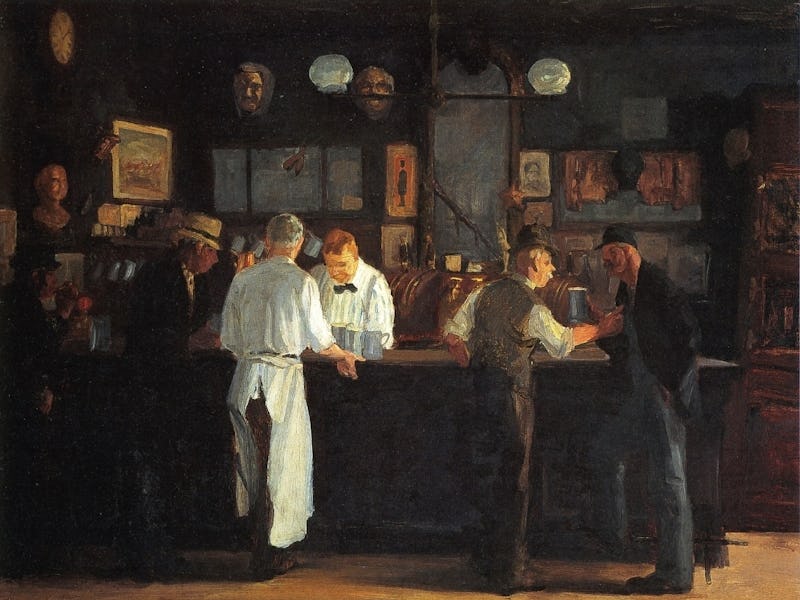Are Cell Phones and High Rents Driving Chatty Bartenders Extinct?
And is that regular browsing Tinder really a regular?

Jr. and Son, a Williamsburg saloon with photos of Sinatra on the wall and dents in the counter, has been open for 80 years. The man behind the bar, Anthony Smith, has been there for the last 40. Outside, sirens scream and times change, but inside it’s quiet. Smith empties ice into the sink, pours Bud Lights, and leans back, almost against the whiskeys, when he’s chatting with a regular.
Back in the day, Smith says, bartenders didn’t just want to talk. They were expected to. But modern social networks can’t be tracked in tabs, and the demands on tapsters are changing. In another 40 years, will there be any Smiths left?
“If you were in a neighborhood bar, everybody knew each other, so you had to talk,” says Smith, recalling an earlier time. “Somebody’s not going to talk to you if they don’t know you.”
But, today, the bulk of the population in major urban centers consists of renters, which means that even people who stay in one city don’t necessarily stay in one neighborhood. Gentrification, driven largely by the increased job flexibility that is an outgrowth of the Internet, is limiting peoples’ ability to become regulars and bartenders opportunity to foster those relationships.
Smith’s bar sits at the non-metaphorical epicenter of that change. Williamsburg has a reputation for being the Brooklynest part of BK for a reason: It has been largely colonized by well-to-do young professionals, the exact sort of people that decided to move to Portland or San Francisco or France for a year.
“Since the neighborhood changed, the bars changed,” says Smith. “There’s no more neighborhood people. People move in, a year later they move out. They’ll stay here for a year, then they’ll go to Bushwick. The old timers, they die. The rent’s too much for them; they couldn’t afford it. That’s what happens.”
And even if people do stay in a neighborhood like this one, there are so many new bars popping up as businesses turn over that novelty often wins out on familiarity.
Julien Levy, a considerably younger bartender at Lowlands Bar in post-industrial Gowanus, still keeps a flame burning for the neighborhood bar. Lowlands is dark, low-key, intimate, and friendly. Levy is happy to chat. Over the two years he’s been bartending there, Levy says, he’s watched a drinking community grow, despite the once-sleepy neighborhood’s changing population. But what he has noticed is a change in the way people interact: The barflies are getting awkward.
Levy complains about customers who walk up to the bar with their noses buried in their phones. “I used to nudge them into ordering something,” he says. “They’d just be spacing out.”
Levy is no luddite – young, outspoken, and covered in tattoos, he’s very much a part of the Tinder generation – but he puts his foot down when it comes to real-life interactions. “The fact of the matter is that it still is a business, and it still is rude to do that. I feel affronted to a degree when people come up to me and don’t even look at me.” Even Smith and his friends back in Williamsburg complained about restaurant dinners where everyone was too busy texting to speak in person.
Social scientists are still documenting the effect of screen time on our social skills, but it doesn’t look good. There’s no smaller wonder than that the demographic trend in city neighborhoods and the opportunity for standoffishness that phones provide have dovetailed. What’s even more worrisome, however, is the thought that the next generation of bartenders might be equally as antisocial as their customers.
Levy tells me about a guy he’d hired that ended up spending all of his time behind the bar on social media. When Levy confronted the man, he explained that he was more comfortable in a “volume” setting than a “neighborhood” setting. “There’s this whole thing: If you’re at a club, no one’s talking to you,” Levy says. “You’re just hustling. Making drinks. Giving people what they want. Here, there’s a role that you have to play. He didn’t get that.”
Despite the changes going on, the bartenders I spoke to didn’t seem to be that worried. David Bermingham, who bartends at the Whiskey Ward, got downright speculative. “In 20 years we might just have a get-drunk pill,” he joked. Like Smith and Levy, he acknowledges that social needs change, but believes that people are always going to seek out IRL human interaction.
“Listen,” says Smith, waving away the complexities of what he’s been doing for the last 40 years. “Forget about what they do. You do what you want to do, and that’s it.”